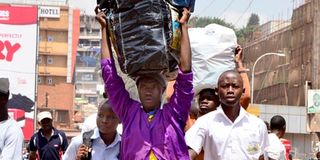Government starts probe into teachers’ skills

Students report back to school for third term yesterday. Photo by Alex Esagala
What you need to know:
- Dr Nassali admitted that majority of teachers across the country are incompetent.
- The government evaluation, which was carried out among government –aided primary schools countrywide, indicated that tutors at PTCs were not any better either.
Kampala. The Ministry of Education has embarked on a nationwide investigation to establish why
The ministry’s Permanent Secretary, Dr Rose Nassali Lukwago, told Daily Monitor in a telephone interview yesterday that the investigation exercise will involve interviewing teachers on why their teaching does not yield the expected performance among pupils.
“The recent report released by Uneb is alarming and depressing. It’s really absurd that some teachers can’t read and solve basic equations. However, we shall revise our recruitment policies because we have realised that majority of these teachers with low grades are given jobs hence poor service delivery in schools,” Dr Nassali said.
A report released by the Uganada National Examinations Board (Uneb) last week revealed that eight out of every 10 primary school teachers who qualified last year can neither read nor solve basic primary-level mathematics questions.
Evaluation
The government evaluation, which was carried out among government –aided primary schools countrywide, indicated that tutors at Primary Teachers Colleges (PTCs) were not any better either.
Less than 20 per cent of them could interpret graphs in similar exams, while only 5.7 per cent final-year college students passed.
The pattern of massive failure was repeated when in-service teachers were tested in the same paper, with only eight per cent able to interpret the graphs.
Tutors performed slightly better than the 30 per cent in-service teachers who passed the number patterns and sequence questions. Trainee teachers tailed at 8.8 per cent.
Some 46,000 Primary Three and Primary Six pupils, alongside 12,300 pre and in-service teachers, as well as 164 tutors were interviewed during the National Assessment of Progress in Education (NAPE) in July last year. They were tested for literacy and numeracy skills.
Dr Nassali admitted that majority of teachers across the country are incompetent but said after the ongoing government investigation, the ministry will revamp the whole recruitment system to ensure only competent teachers are employed for teaching. “Our officials are on ground and we shall present our findings after the exercise. When our children are not well mentored, they become half-baked and this blame goes back to the teachers. That’s why we shall engage them to find out what hinders their competence,” Ms Nassali said.
However, she did not disclose when the investigation report will be released but said that it “won’t take a lot of time” because the government must find remedies to quickly revamp the education system.
Speaking ahead of the opening of the third term for schools yesterday, Dr Nassali, noted that there is less time remaining because of the national primary and secondary examinations timetables which are already out with Senior Four candidates sitting their examination papers next month.
“This term will end mid-December and this means that both teachers and students have less time to prepare. Candidate should double their efforts so that they excel,” Dr Nassali said.
She added: “These exams will determine their next academic journey. Teachers should also help learners to revise and avoid cramming of notes by the latter.”
Dr Nassali also said that the Education ministry will work with UNEB to ensure a smooth examination period.
“We are ready to supervise the examination exercise and we call upon teachers and candidates to comply with our set standards. However, teachers should also strive to get better grades from their students,” she said.





